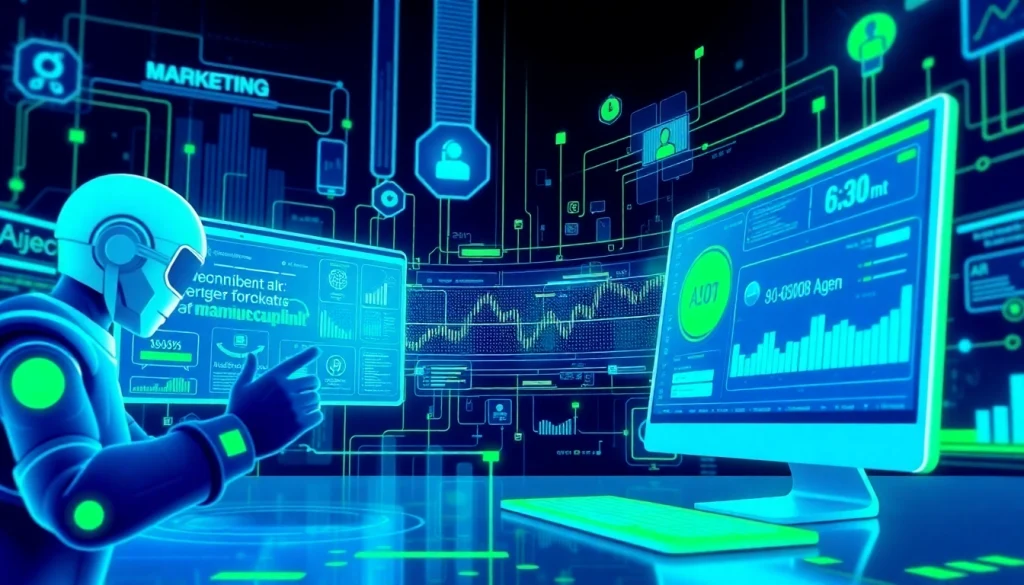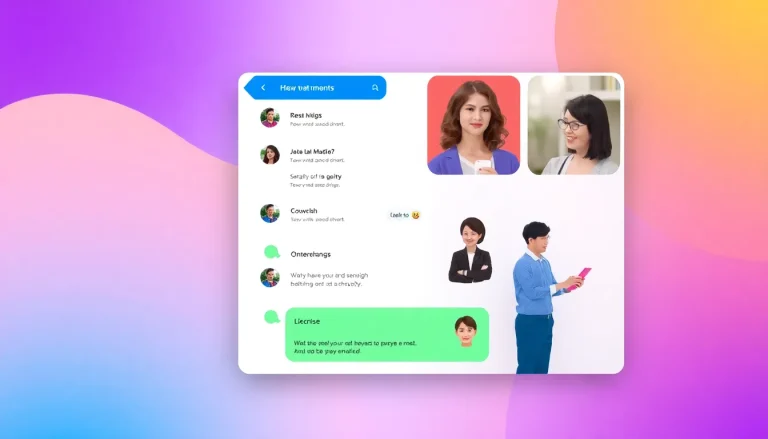
Understanding AI Marketing Agents
In today’s fast-paced digital landscape, businesses are increasingly turning to AI marketing agents to streamline their operations and enhance their marketing strategies. These software tools leverage artificial intelligence to automate specific marketing tasks, providing marketers with the ability to focus on higher-level strategy while improving efficiency and effectiveness across various channels.
Definition and Functionality
AI marketing agents are sophisticated software programs designed to handle a range of marketing tasks. They utilize various forms of artificial intelligence—including machine learning, natural language processing, and data analytics—to execute tasks that would traditionally require human intervention. Their core functions include data analysis, customer targeting, content creation, and performance tracking. The rise of AI marketing agents signifies a shift towards automation in marketing, allowing companies to scale their efforts while maintaining personalized engagement with customers.
Benefits over Traditional Marketing Methods
One of the most significant advantages of AI marketing agents is their ability to analyze massive datasets quickly and accurately, offering insights that would be time-consuming for humans to derive. Traditional marketing methods often rely on manual processes, which can lead to inefficiencies and missed opportunities.
Here are some of the key benefits of using AI marketing agents:
- Efficiency: Automating repetitive tasks such as email marketing or social media posting frees up time for marketers to focus on strategic decisions.
- Personalization: AI agents can analyze individual consumer behavior and preferences, enabling marketers to deliver tailored content that resonates with specific audiences.
- Real-time Analytics: These tools provide insights on marketing performance in real-time, allowing for quick adjustments to campaigns as needed.
- Cost-effectiveness: By reducing the need for extensive manpower and improving campaign targeting, companies can significantly reduce marketing costs.
How AI Agents Operate in Real-Time
The hallmark of AI marketing agents is their ability to operate in real-time. By continuously gathering and analyzing data, they can adapt their strategies based on ongoing performance metrics and audience interactions. For instance, if an email marketing campaign is not performing as expected, the AI can automatically modify the messaging or the audience segments being targeted. This proactive approach increases the likelihood of achieving better results and fosters a data-driven culture within marketing teams.
Common Use Cases for AI Marketing Agents
AI marketing agents are versatile tools that can be applied across various marketing functions. Here are some of the most common use cases:
Customer Segmentation and Targeting
One of the most powerful applications of AI in marketing is customer segmentation. AI marketing agents analyze customer data to identify distinct segments based on behavior, preferences, and demographics. This allows companies to target their marketing efforts more effectively, ensuring that messages reach the right people at the right time.
For example, a retail company might use an AI agent to segment its audience into groups such as “frequent buyers,” “discount shoppers,” and “occasional visitors.” By tailoring campaigns to these specific segments, the company can increase engagement and conversion rates significantly.
Content Personalization Strategies
Content marketing is another area where AI marketing agents excel. These tools can analyze past interactions to guide the creation of personalized content that aligns with consumer interests. AI algorithms can determine the optimal content type—such as blog posts, videos, or infographics—and the best time to deliver it.
For instance, if a customer frequently engages with video content about fitness, an AI marketing agent can prioritize video ads related to fitness products in their marketing strategy, thereby enhancing the likelihood of conversion.
Campaign Optimization Techniques
AI marketing agents can be invaluable for continuous campaign optimization. By monitoring key performance indicators (KPIs) such as click-through rates, conversion rates, and customer engagement, AI agents can identify which elements of a campaign are performing well and which need adjustment.
Machine learning models can analyze patterns from past campaigns to suggest improvements in real-time, allowing marketers to pivot quickly and optimize their strategies effectively for better results. This level of adaptability is critical in today’s dynamic marketing environment.
Choosing the Right AI Marketing Agent
With the increasing availability of AI marketing agents, selecting the right one for your business can be a daunting task. Here are some key considerations:
Evaluating Key Features and Capabilities
Not all AI marketing agents are created equal. When evaluating options, consider what features are most important for your needs. Key capabilities may include:
- Data analysis: The ability to gather and interpret vast amounts of data.
- Integration: Compatibility with your existing marketing tools and platforms.
- Automation: The extent to which the agent can automate tasks.
- User-friendliness: An intuitive interface that simplifies usage for marketing teams.
Integration with Existing Marketing Tools
Another essential aspect to consider is how well the AI marketing agent integrates with your current marketing technology stack. Seamless integration can enhance efficiency and help ensure that all tools work together smoothly, allowing for a more holistic approach to marketing.
For example, if your team uses a certain Customer Relationship Management (CRM) software, choosing an AI marketing agent that can effortlessly sync data with that platform will streamline processes and enhance data accuracy.
Cost vs. Value Analysis
While cost is always an important factor, it’s vital to analyze the value an AI marketing agent can bring to your organization. Assessing the potential return on investment (ROI) involves understanding how the agent can save time, reduce costs, and drive revenue growth. Sometimes, a more expensive option may yield greater returns in the long run due to its advanced capabilities and effectiveness.
Implementing AI Marketing Agents in Your Strategy
Successfully integrating AI marketing agents into your marketing strategy requires careful planning and execution. Here’s a step-by-step guide:
Step-by-Step Integration Process
The integration process can usually be broken down into the following steps:
- Define Objectives: Understand what you aim to achieve with the AI marketing agent. Set clear, measurable goals to guide the implementation process.
- Choose the Right Agent: Select an AI marketing agent based on your needs and the criteria discussed earlier.
- Train Your Team: Ensure that your marketing team is familiar with the new technology. Providing training sessions can help maximize productivity and engagement.
- Start with a Pilot Program: Implement the AI agent on a small scale first. Monitor its performance closely to identify areas for improvement.
- Scale Up: Once you’re satisfied with the pilot results, gradually expand the integration of the AI marketing agent into your broader marketing strategy.
Measuring Success and Performance Indicators
Measuring the success of your AI marketing agent involves identifying relevant KPIs to track. This could include metrics like:
- Email open and click-through rates
- Conversion rates from campaigns
- Customer engagement levels
- ROI from marketing efforts
Continuously assess these metrics to evaluate performance and make necessary adjustments to optimize effectiveness.
Adjusting Strategies Based on Insights
AI marketing agents thrive on data, providing insights that can dramatically impact your marketing strategy. It’s crucial to stay adaptive and responsive to the insights generated by your AI tools. Use these insights to fine-tune your targeting, messaging, and overall strategy to better align with consumer preferences and market trends.
The Future of AI Marketing Agents
As technology continues to evolve, so too will the role of AI marketing agents. Here are some trends and possibilities to keep an eye on:
Emerging Trends and Technologies
Emerging technologies like advanced natural language processing (NLP) and machine learning are making AI marketing agents increasingly powerful. Future developments may lead to even more sophisticated tools capable of understanding context, anticipating customer behavior, and creating content almost indistinguishably from humans.
Moreover, as businesses allocate more budget toward AI-driven marketing, we can expect a proliferation of innovative AI marketing solutions tailored for distinct sectors or marketing needs.
Potential Challenges and Solutions
Despite the benefits, there are challenges associated with implementing AI marketing agents. Issues such as data privacy, ethical considerations, and reliance on technology can surface. Businesses must develop robust policies and protocols to address these concerns, ensuring compliance with regulations while fostering consumer trust.
Educating your team about AI technologies and their implications can also mitigate resistance to change and equip your team to handle challenges effectively.
Long-Term Impacts on Marketing Dynamics
In the long run, AI marketing agents will reshape the landscape of marketing by enhancing personalization, improving customer interactions, and increasing efficiency. Companies that embrace this technology will likely gain a competitive edge, allowing them to adapt more quickly to market changes and consumer needs. As AI marketing agents become essential tools in modern marketing, businesses must focus on mastering their use to remain relevant and profitable.




